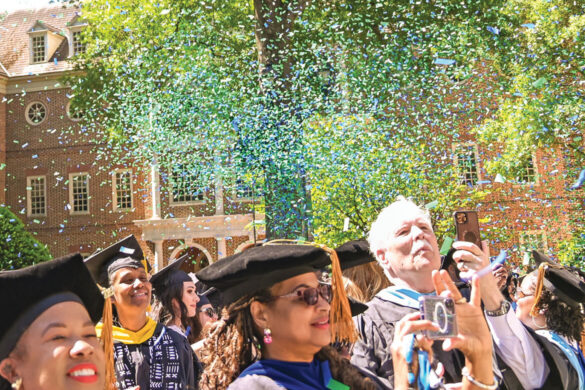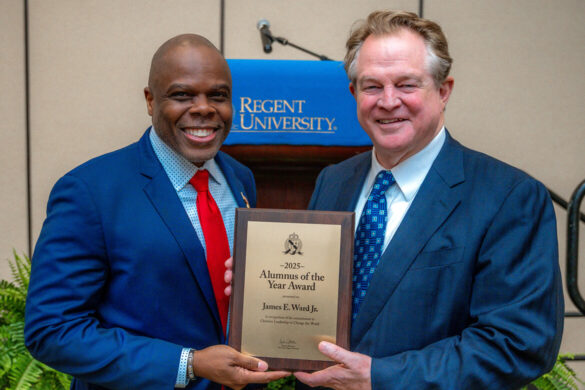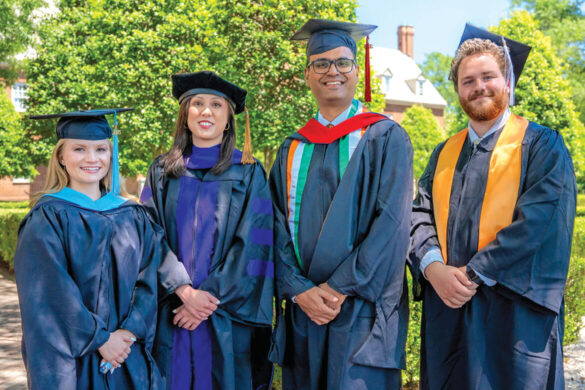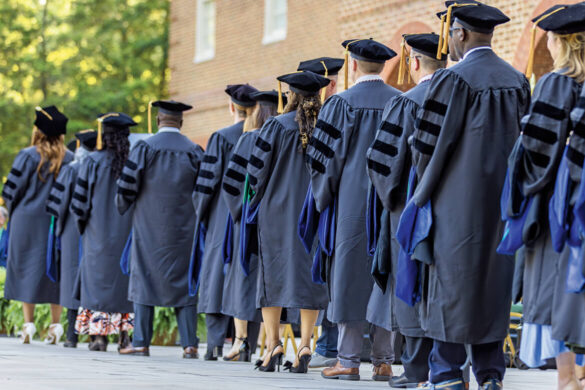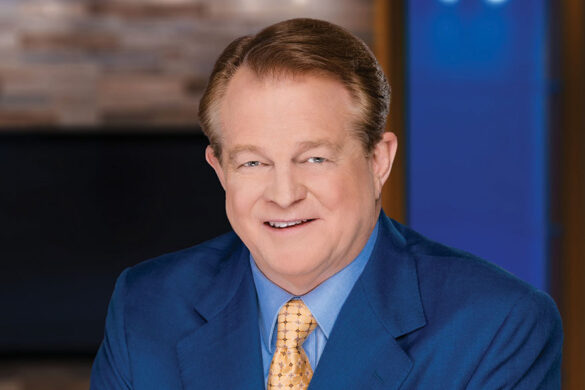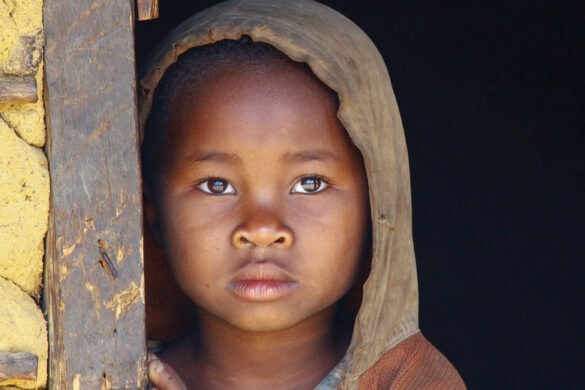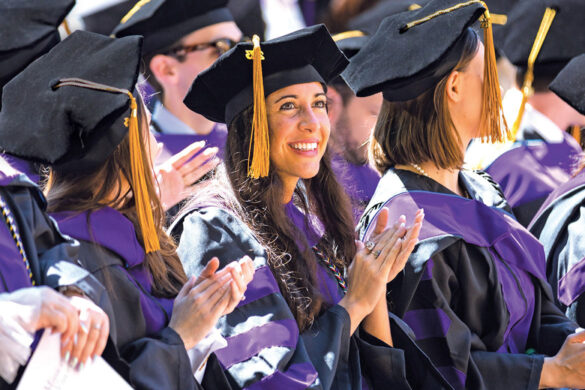Honoring the Fallen With a Look to the Future
As Afghanistan dramatically fell to the Taliban in August, Regent University’s Robertson School of Government was in high gear preparing for “9/11: A 20-Year Retrospective,” a 12-hour virtual event designed to honor the 3,000 victims of that fateful day that changed America. The event was streamed on the university’s website on September 9 and can be viewed by visiting regent.edu/911.
Michele Bachmann, dean of the Robertson School of Government, said seeing the events of September 11, 2001, come full circle—from the attacks to America’s response going to war in Afghanistan to that country’s collapse—provided a unique perspective on how and why it happened and valuable insights for moving toward peace and reconciliation.
After noticing a lack of promotion of 9/11 commemorative events, Bachmann explained that Regent’s event, through prayerful reflection, was organized, taking on a two-pronged approach in its planning.
“I thought it would be important to look at the facts of what happened on that day, in an academic setting, with exciting speakers with real experience who were a part of that day and the surrounding events,” said Bachmann.
“First, we wanted to honor the memory of the 3,000 innocent people who perished on that day. They deserve to be remembered,” Bachmann said. “The ground is sacred and hallowed where they were senselessly murdered, and we intend to honor their memory.”
Bachmann said the second objective was to provide perspective on the profound changes 9/11 brought to the country.
“The United States of America changed that day. In many senses, that reverberation was felt around the world. I thought it was important that we look at what led up to 9/11 and then also look at the aftermath of these 20 years,” she said, adding the fall of Afghanistan made that all the more important.
“The events of 9/11 were planned in the caves of Afghanistan by Osama bin Laden. That’s where the mastermind carried out the training and all that was laid out ahead of time to bring about this attack. So, now we are really seeing the circle completed with America’s response to the attack and now the conclusion, which was the collapse. It wasn’t just 20 years ago. It’s also how that event from 20 years ago impacts us today.”
She said that as word of the event spread, a wide-ranging host of international experts in government, the military, the nonprofit sector, and diplomacy offered to participate in covering topics including the history of terrorism and the terrorists’ mindset, cybersecurity, and secularism in the Islamic world, among others.
Moderating, Bachmann introduced Dr. M.G. “Pat” Robertson, founder, chancellor and CEO of Regent University, who provided opening remarks for the event and shared his personal memory of September 11, 2001. He recalled he was on the air taping the 700 Club when at 9:05 a.m., he received word that the Twin Towers in New York had been hit by aircraft.
“I happen to be a private pilot, and I have personally flown out of LaGuardia. And I knew good and well on a clear day there was no way under heaven that somebody coming out of LaGuardia Airport was going to hit a building in New York City in Manhattan. So immediately, I realized this wasn’t some kind of an accident. It was a terrorist attack,” shared Robertson.
I thought it would be important to look at the facts of what happened on that day, in an academic setting, with exciting speakers with real experience who were a part of that day and the surrounding events.
Michele Bachmann, Dean of the Robertson School of Government
Bachmann noted that when Pompeo left office, Afghanistan was experiencing no havoc and that no [terrorist-related] deaths occurred under the Trump Administration in the last 18 months before Afghanistan’s collapse.
Pompeo addressed the recent events in Afghanistan, calling the event we are seeing “just tragic.”
“We understood that American power mattered. We had obligations and responsibilities to the American people, and that getting our young men and women home was an absolute imperative. That it had to be done only when the conditions permitted it to be achieved,” said Pompeo.
In a later segment, Bachmann introduced former Attorney General John Ashcroft for the keynote Q&A entitled “On the Front Lines and in the Fire: An Inside Account of the Response to 9/11.” She also interviewed Ambassador Pete Hoekstra and Bernie Kerik, the New York City Police Department Commissioner when the attacks happened.
Other featured guests included: FBI agent Brig Barker, who tracked terrorist Mohammad Atta through Egypt and North Africa; and Kyai Haji Yahya Cholil Staquf, General Secretary of Nahdlatul Ulama, the world’s largest Muslim organization which disavows violence and terrorism in the name of Islam.
The program included academic and spiritual elements, including messianic Rabbi Jonathan Cahn, author of the bestselling book, The Harbinger.
“He brings biblical insights to the events of September 11th like no one else. I think that his biblical perspective—to those who are believers—will be profound because he takes the scriptural principles and applies them in a way that I haven’t seen anyone else do,” Bachmann said. “He isn’t twisting scripture. He’s bringing light on scripture so that we understand what it means. I think people will want to hear him.”
Eric Patterson, Scholar-at-Large and former dean of the Robertson School of Government, hosted “Rebuilding After Radicalism: A Frontline Account from Iraq after Isis.” The panel featured Dr. Yvette Isaac, founder of the nonprofit Roads of Success dedicated to Middle Eastern women, persecuted Christians and minorities, and her daughter Jacqueline Isaac, a lawyer, humanitarian and vice president of the organization. A highlight of the wide-ranging discussion included a
the conversation about integrating religious leaders into the peace process.
Another poignant part of the program is “Regent Remembers,” a 30-minute segment featuring the recollections of faculty, staff, students, and alumni.
Gary Roberts, a professor of public administration at the Robertson School of Government, recalled how 9/11 led him to an encounter with the Holy Spirit that brought him to Regent University.
“I recognized as a professor, I needed to put the Lord first, and that led to a fire in my heart to then use my position as a professor to promote the Christian worldview,” Roberts said. “This led me to Regent University in 2003. And from that moment, the goal here was to produce Christian servant leaders to change the world, to be the antidote for that poisoned mindset that says violence is an act of God.”
During the planning stage of the event, Bachmann shared with Impact that she hoped that the event would produce three powerful takeaways for its audience.
“We want them to take away truth, knowledge and perspective,” Bachmann said. “We want them to know the truth of what happened, not a politically correct version of what happened. We want them to have knowledge from people who were first-hand eyewitnesses of the events. Thirdly, we want to have perspective because this is a 20-year event, and we have events that are very hot, very active, very kinetic, happening right now.”




